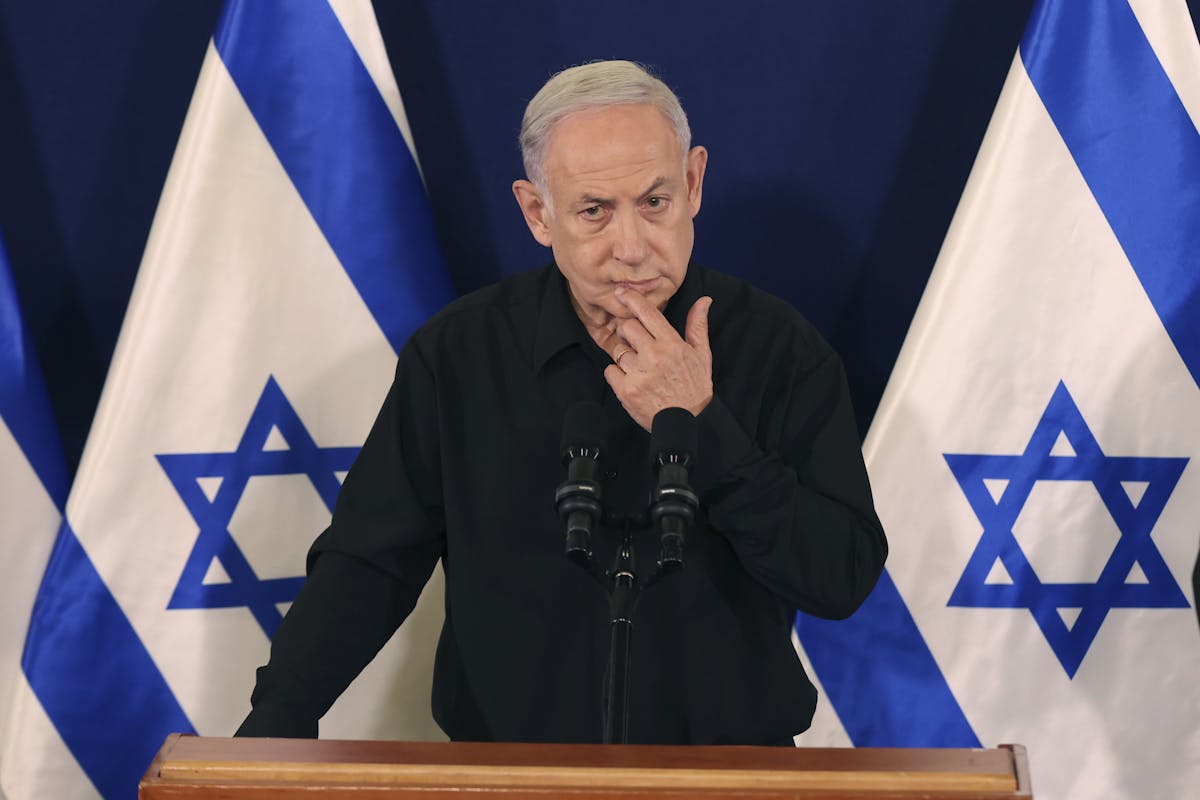Jerusalem Keeps a Barstool Clear for Putin — but Not Zelensky — Amid the Gathering War
As Israel does battle with Hamas, everything else takes a backseat — some diplomatic niceties included.

It is almost a rite of passage in these troubled times — world leaders drop into a hot zone just long enough to flash a smile of scripted solidarity and scoop up a photo opportunity before hightailing it back to where the rockets hopefully aren’t flying.
It happened in the months after Russia’s invasion of Ukraine and in the days after Hamas’s attack on southern Israel, with one notable exception: Israel has not cleared space on the tarmac to welcome President Zelensky, despite the Ukrainian leader’s expressed wish to fly in.
That such a visit has yet to happen may be less a reflection of Jerusalem’s cold shoulder than Prime Minister Netanyahu’s clear-eyed assessment of who some of the real power brokers are in the Middle East right now and the need to prioritize accordingly, especially as a complex and dangerous war is unfolding.
It is also not a climate conducive to niceties. After raining missiles down on Ukrainian civilians for 20 months, it was almost fitting that President Putin allowed nine days to pass after the Hamas onslaught on October 7 before calling Mr. Netanyahu and offering him his condolences. Mr. Zelensky, by contrast, called Mr. Netanyahu immediately.
The Ukrainian president, who is Jewish, seems to understand that giving the impression that he wants to compete with Israel for Americans’ attention would be disadvantageous for him. Mr. Zelensky proposed to pay a visit to Israel to show he stands with Israel. The answer, according to various Israeli press reports, was short: “Not now.” President Biden and the leaders of Italy, France, Britain, Germany, and Greece were welcome without hesitation; but for the man from Kyiv, Mr. Netanyahu did not find time.
The war on the northeastern periphery of the European Union and the second one at the crossroads of civilizations in the Middle East reflect fractures along the same fault lines of the international system. They are not, though, easily superimposable. They do not fall into the same patterns: not even if the Russian government ingloriously received a Hamas delegation last week, nor if the same terrorist organization signaled over the weekend that it might free the Israeli hostages who also hold Russian passports.
The Kremlin’s relationship with Hamas is both documented and odious. As with Turkey’s president, Mr. Putin seems little concerned by the old adage that one can be judged by the company one keeps. It is the relationship between the Kremlin and Israel that is more nuanced and interesting, in light of present circumstances.
The clue that long precedes October 7 is in the fact that Mr. Netanyahu leads the only advanced democracy in the world not to have launched sanctions against Russia after the invasion of Ukraine. True, Turkey has not sanctioned Moscow either, but it would take quite a fabulist to call Turkey a democracy. With the exception of the sale of a defensive electronic warfare system, Israel has not supplied weapons to Kyiv. Various factors continue to push the Jewish state to maintain an open channel with Moscow, despite Russia’s coziness with Iran and Mr. Putin’s chilling ambiguity toward Hamas.
The 900,000 Israelis of Russian origin — one tenth of the Israeli population — are a factor. Above all, Moscow has controlled large chunks of Syria for years and could become instrumental in preventing attacks from those areas against Israel by factions linked to Tehran.
In the future, after the war in Gaza, the intervention of an international contingent with a mandate from the United Nations and peacekeepers from Muslim-majority countries could be proposed. At that point Moscow’s consensus or at least abstention in the Security Council would be needed. It would be an opportunity for the Kremlin to try to reclaim a seat at the world diplomatic table where it is now mostly a zombie, and Mr. Putin is, apart from anything else, an olympian opportunist.
For now, as unsavory as it is, Mr. Putin is interested in maintaining relations with Hamas and Islamic extremism. Not only is Islam the second most prevalent religion in Russia, especially in the volatile Caucasus, but his public-facing ambivalence on Gaza burnishes his image throughout the range of Muslim countries: from Iran to Saudi Arabia by way of Tunisia, Algeria, and in a roundabout way to the streets of London and Paris as they swirl with anti-Israel sentiment.
An explosive Middle East creates a welcome distraction for Russia. The attention of Western governments is already diverted. The war Hamas unleashed in the Middle East also takes away something more concrete from Ukraine: significant American munitions. It is estimated that Kyiv needs 350,000 155 millimeter artillery rounds a month. Europe currently manages to produce 650,000 in a year. Reuters reports that in terms of air defense rockets and artillery shells, “Kyiv is now competing directly with Israel for Western supplies, especially from the United States.”
A renewed debate over whether America has overextended itself around the world may only have just started. In the Middle East right now the time for debate is over: there is jockeying from capitals north and south of Jerusalem as there has always been, but now it is only the fight, and winning it, that counts. Ukraine will likely understand that.

